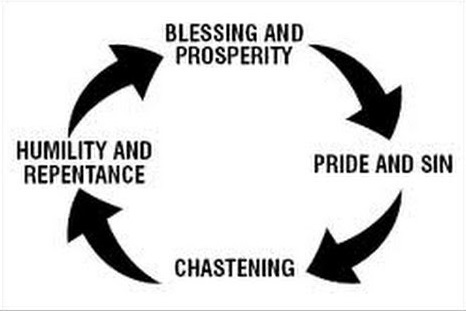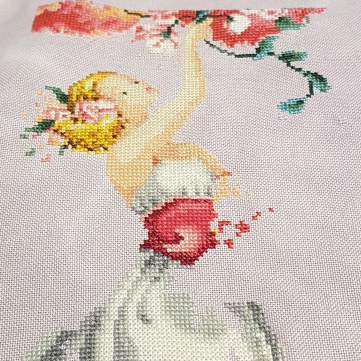This week, I come to the Church in the days of Alma. Alma was a repentant sinner who changed his ways and came to serve as both chief judge and high priest among the Nephites in the Book of Mormon. During the time of his ministry, the Nephites were in a period of relative peace, and the church members began to prosper, and the church began to grow as new members were baptized. It seems like a happy ending rather than the middle of the story. But rarely in the Book of Mormon does prosperity end happily. These periods tend to be rather short, and they always end the same. In this case,
And it came to pass in the eighth year of the reign of the judges, that the people of the church began to wax proud, because of their exceeding riches, and their fine silks, and their fine-twined linen, and because of their many flocks and herds, and their gold and their silver, and all manner of precious things, which they had obtained by their industry; and in all these things were they lifted up in the pride of their eyes, for they began to wear very costly apparel.
Now this was the cause of much affliction to Alma, yea, and to many of the people whom Alma had consecrated to be teachers, and priests, and elders over the church; yea, many of them were sorely grieved for the wickedness which they saw had begun to be among their people.
For they saw and beheld with great sorrow that the people of the church began to be lifted up in the pride of their eyes, and to set their hearts upon riches and upon the vain things of the world, that they began to be scornful, one towards another, and they began to persecute those that did not believe according to their own will and pleasure.
When I read these verses growing up, I was always surprised or caught off guard when the Nephites became prideful. How could they let this happen? They have a prophet, they have a righteous leader. In general, things were going well for them and the Lord was blessing them. They have the scriptures and the records of their fathers. They know what is right and wrong. How could things change so quickly, often in the space of just a few verses?

In Sunday School, we label such a phenomenon the pride cycle. We usually diagram it out into four phases: prosperity, pride, destruction, repentance, and then the cycle begins again. But while the lesson would suggest that we should avoid pride individually, it never occurred to me that such pride cycles could very well be operative ona church-side today as well. As members of the restored Church, we are beyond such petty grievances, are we not? With a living prophet, we cannot go astray. Our Church manuals assure us so:
“I testify in the name of Israel’s God, that he will not suffer the head of the Church, whom he has chosen to stand at the head, to transgress His laws and apostatize. The moment he should take a course that would in time lead to it, God would take him away.”
We know that the Church has been restored, and won’t be taken away from the earth again, so we can be assured we are safe from any pride cycles or what have you. The Lord is at the helm.
The ChangeBut eventually as I read more in the scriptures, I began to take them more seriously. Really, what makes us any different from the Israelites in the Old Testament, the Jews in the New, the Nephites in the Book of Mormon? We haven’t become somehow immune to sin, and we are subject to the same patterns that they are. Modernity doesn’t somehow offer blanket protection from the same foibles of those who have gone before. In the days of Joseph Smith, the Saints weren’t somehow safe. They received multiple condemnations from the Lord:
And your minds in times past have been darkened because of unbelief, and because you have treated lightly the things you have received—
Which vanity and unbelief have brought the whole church under condemnation.
And this condemnation resteth upon the children of Zion, even all.
And they shall remain under this condemnation until they repent and remember the new covenant, even the Book of Mormon and the former commandments which I have given them, not only to say, but to do according to that which I have written—
Is it possible that we as church members can “wax proud” because of our “exceeding riches?” We all aim to be comfortably middle class. Our jobs all too easily become our first priority, and we struggle to bring them into balance, always trying but never succeeding to get that “work-life” balance. We as a people fall all too easily for get-rich-quick schemes. Aspects of Mormon culture revolve around appearances, including our own brand of “costly apparel” and lavish home decor. Is it possible that waxing proud because of our riches isn’t purely a Nephite phenomenon, and we too can do it without even noticing?
What vain things of the world do we fall prey too? Video games? Football and sports channels? Investments and stocks? Are essential oils really essential? What other things do we make absolutely essential, to the point that we cannot be happy without them? “I cannot tell you all the things whereby ye may commit sin.”
How are we scornful one towards another? Do politics become an irreconcilable conflict with our families or our Sunday School classes? Do we accuse one another? Do we gossip or talk behind on another’s back? Do we hold grudges? Do we exclude or avoid certain members of our wards? “The teacher’s duty is… to see that there is no iniquity in the church, neither hardness with each other, neither lying, backbiting, nor evil speaking.” Such things haven’t conveniently become non-problems, but still abound among us today.
Finally, do we as ward members find ourselves persecuting those who do not “believe according to” our “own will and pleasure”? Do we believe that our viewpoint is the single and valid one? Do we engage in Facebook/Youtube comment wars, defending abstract doctrines rather than expressing love and sympathy to those who might be in pain? Do we suffer from Job’s Comforter’s syndrome, blindly defending God while losing sight of our brothers and sisters who are right in front of us?
We need to recognize that the pride cycle is a very real thing, not an abstract concept relegated the old and dusty scriptures. We need to realize that repentance must take place in our hearts as individuals, but we must also seek out the weaknesses and sins we have as a people. The story of the Nephites doesn’t end well. After generations of sin, they are eventually wiped off the face of the land. The Nephites were a pattern and a warning, and we should take it seriously, and we should seek to root out any pride before we gain any momentum in another round of the pride cycle.
Advertisements Share this:- More





